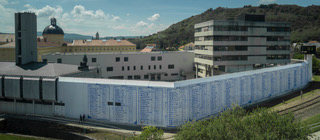Ramesch Daha
Studio grant holder in Stockholm 4 February – 30 April 2019
Ramesch Daha (AUT), born 1971, Tehran, lives and works in Vienna, Austria.
In my multi-part work complexes, I employ a variety of media, including painting, collage, video and drawing as well as documents from public and my personal archives. Based on extensive historical research, my artistic work connects biographical historical aspects, collective memories and historical-political events in new constellations. In the “Sigmund Klein” project, I trace a personal archive and process findings with an artistic approach. Sigmund Klein was the father of my stepgrandfather. He was deported from Vienna to the concentration camp Dachau after the Reichspogromnacht in 1938. At that time his son, my stepgrandfather, was 15 years old and he survived with his mother as the son of a Czech Jew and a political activist.

After Dachau, Sigmund Klein was sent to the concentration camp Buchenwald, and about two years later to the concentration camp Ravensbrück where he was killed in 1942. Klein’s son kept photographs, the letters of his father that he wrote during the four years of imprisonment, documents and all tools of his father, who was a tinsmith. The plan for the Iaspis residence is to continue to work on this project.
Daha has received broad international recognition with her ongoing series “Victims 9/11”, in which she attempts to save the victims of the terrorist attack from oblivion by portraying every single one of them. Daha has been represented internationally in numerous solo and group exhibitions and publications, most recently in “Creating Common Good” (Kunsthaus Vienna, 2014), “The Dignity of Man” (Vienna, Sarajevo and Brno, 2014), “raus hier” (Kunstpavillon Munich, 2014) and in the show “Meeting Points 7: Ten thousand wiles and one hundred thousand tricks” (Belvedere at 21er Haus, Vienna); Nagel-Draxler Berlin (2018); Public art, prison wall painting, Austria (2018). Her works are represented in numerous art collections, including Albertina Vienna, Joanneum Graz, Kupferstichkabinett and the collections of the City of Vienna and the State of Lower Austria. In 2014, she received the Gmoser Prize of the Vienna Secession. Ramesch Daha lives and works in Vienna.

